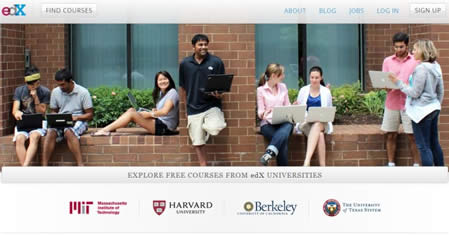
But what do MOOCs really do? What impact are these courses having on the higher education system or the job force? The MOOCs overseen by the likes of Harvard and MIT, called edX, just announced in September that it would let students take a final exam in order to “help its learners improve their employability and career prospects.” However, would putting one of these certifications on your resume really help you snag an interview?
The front pages of Coursera or edX feature courses like Cryptography, Introduction to Solid State Chemistry, and even Equine Nutrition. These are not the types of courses one might expect to improve his or her career prospects. While it might seem cool and intellectually stimulating to spend fifteen hours per week learning about Artificial Intelligence from a professor at UC Berkeley, a course like this is not exactly practical for many Americans struggling in this terrible economy.
In light of this, we rounded up a few MOOCs which might help boost your career and your resume.
1. Networks: Friends, Money, and Bytes
Taught by Mung Chiang of Princeton University
Incredibly, this course actually has the ability to land you a job or get your resume in front of the nation’s biggest companies. According to the course’s homepage:
This course will launch the Grand Challenge Homework (GCH) program. Throughout the course, there will be about 10 open-ended, project-like challenges (in social and technological network engineering) provided to all the enrolled students. Associated with GCH is an Industry and Investor Partners (IIP) program. About 10 leading US companies and venture capitalists in the networking industry have agreed to screen the finalists selected by the teaching staff, and then explore opportunities with the selected students to turn their ideas and prototypes into new products and companies. You pour your creativity and energy in this course, we will help create career-changing opportunities for you.
This course doesn’t just teach its students about major, online corporations, it also has the potential to change lives.
2. Think Again: How to Reason and Argue
Taught by Walter Sinnott-Armstrong and Ram Neta of Duke University
Many will argue that the purpose of higher education, specifically liberal arts education, is to teach students how to reason and question the world around them. Evaluating others’ arguments and crafting convincing arguments are the main objectives of this course. These skills become particularly useful when students enter the job market. Many companies, especially startups, which are more likely to hire someone with little to no experience, require their applicants to show high levels of creative reasoning. In addition, wouldn’t it be nice to convince your boss that you are worthy of that promotion?
3. CS50x: Introduction to Computer Science
Taught by David J. Malan of Harvard
Introduction to Computer Science is Harvard’s largest on-campus course, so it makes a lot of sense that the school would offer it online as well. The course has no prerequisites, which means that you don’t have to be a computer programmer in order to enroll. The course goes over multiple computer languages including C, PHP, and JavaScript plus SQL, CSS, and HTML, all of which would be assets to your resume. Our world is turning digital and even the smallest businesses are putting themselves online. Job applicants make themselves more valuable by obtaining a basic understanding of the languages that drive the digital world. Don’t be left behind!
4. An Introduction to Operations Management
Taught by Christian Terwiesch of the University of Pennsylvania
How does one make that step to become a manager? Obviously, it’s important to impress your superiors and take on as much responsibility as possible. Obtaining management skills without actually being a manager, however, can be difficult. Although there are no prerequisites for the course, it is designed for business students and executives. This course will teach you the fundamentals of business processes and help you solve the real problems which your company faces. It can also help you prepare to apply for a master’s degree in business administration, a degree that will almost certainly help you move up in the ranks.
5. Fundamentals of Personal Financial Planning
Taught by Don DeBok from UC Irvine
With student loan debt reaching one trillion dollars, it appears most people in the nation could use this course to plan their personal finances. Many people see going back to school as a way to forward their careers. Although this may be true, you have to be aware of personal finances if you don’t want to end up in debt for the next 25 years. This course is most relevant to prospective students, current students, and the parents of future college students. If you are considering going back to school to further your career, look into this free financial planning course first.
Take a look through some of the Coursera or edX courses yourself and let us know what you think in the comments below. Are we missing any career-boosting courses? Has a MOOC boosted your career?
